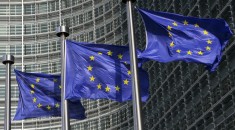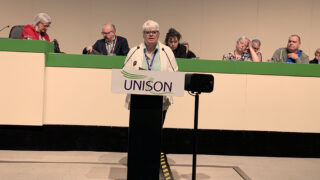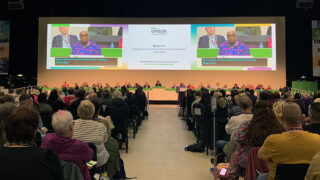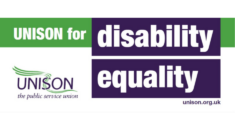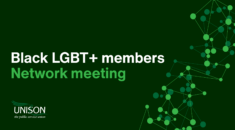Black members’ conference opened this morning with a farewell speech from national committee co-chair Margaret Greer, who becomes the union’s national Black members’ officer tomorrow.
But after the applause for Ms Greer had died down, delegates returned to debate with a motion from the national Black members’ committee on immigration and austerity, which stressed that “all workers” have an interest in defending migrant workers as well as all workers.
And while there is a genuine fear about the current problems and pressures on public services, the cause is not immigration, but the government’s continued commitment to ideological austerity.
It was stressed that immigrants has helped economies and indeed, in the UK, immigrant workers are essential in keeping services going – not least, the NHS.
Debbie Louden from Norwich spoke about how she was helping refugees arriving in the area and how her own family crossed religious boundaries from Christian to Muslim to Hindu, but they were “all together”.
Conference agreed to ensure that the union continues to be at the forefront of campaigns to defend migrant workers and to fight racism in all its forms.
A motion on the impact of the election of Sadiq Khan as London mayor, looked at how the capital’s electorate had rejected the racism and Islamophobia of the campaign against him, “choosing hope over fear” and electing him “with a huge political mandate” – a result providing a positive role model to young Black people, including UNISON members.
Simone McCoy from London introduced a motion on how mental health issues affect young Black people.
“You don’t just wake up one morning and say: ‘Today, I’m going to try me some metal health’,” she told delegates.
And, “when things mount up … it’s okay to ask for help,” she stressed.
Paulette Rose from London, said that, working in further education, in a very diverse environment, she said that there was still a problem with people not acknowledging or talking about the problems.
While it is vital to continue to fight cuts to services, she stressed that it was also important to remember that it is “the village that raises the children” and that members and activists can help to spot situations and guide people to the help they need.
Craig Edmonds from London, a youth service manager, told the hall how clearly he sees the effect of austerity on young people’s services.
He related his own experience of not really understanding mental health issues, but needing help himself, and urged members to do what he had decided to do as a result – and “pay it forward” by ensuring that he was there to help others in need.
A busy morning’s business also saw a debate on the effects of the EU referendum, with conference hearing that “we, as Black members, know that racism has never gone away,” but that the referendum had emboldened racists, with a surge in abuse and attacks after the result was announced.
There was applause as one delegate asked why some Black people had voted for Brexit – and, in the US, for Donald Trump as president – “Why have we voted against ourselves?”
And she called for an open discussion of such questions.
It was emphasised that UNISON will be working to ensure that Brexit “negotiations don’t just defend the interests of the rich”.
On Black representation, delegates heard how the Scottish government has proposals on gender equality in public appointments, and called for work to increase Black representation on public boards and assist Scottish Black members in lobbying Holyrood to improve Black representation too.


